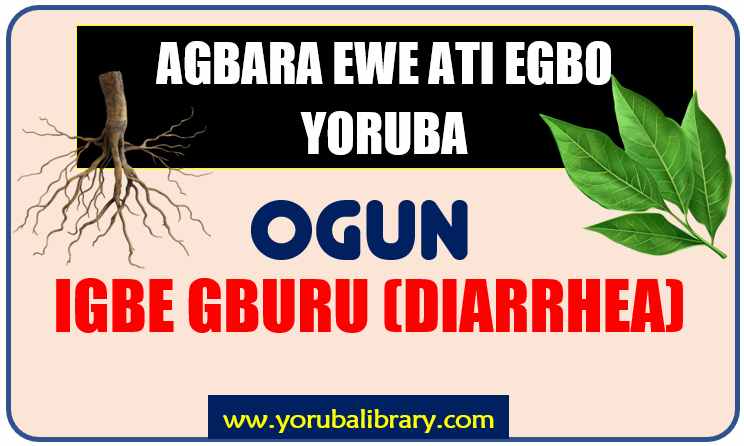
support@yorubalibrary.com
+2348073529208, 07038599574

In Yoruba tradition, diarrhea—locally referred to as Igbe Gburu—is recognized as a condition that can disrupt body's balance. Recurrent or severe diarrhea, often accompanied by watery or mucus-like stools, dehydration, and weakness, was seen not only as a bodily ailment but also a sign of imbalance in the digestive system. Our forefathers in Yoruba land developed Ogun Igbe Gburu, a Yoruba medicine designed to restore digestive health, prevent dehydration, and strengthen the body. The remedies combine carefully selected herbs, barks, and roots to ensure full recovery.
Our forefathers in Yoruba land developed Ogun Igbe Gburu, a Yoruba medicine designed to restore digestive health, prevent dehydration, and strengthen the body. The remedies combine carefully selected herbs, barks, and roots to ensure full recovery.
Yoruba elders emphasized early treatment because uncontrolled diarrhea could quickly lead to weakness, nutrient loss, and vulnerability to other illnesses. This medicine was trusted for its ability to cleanse the digestive tract while reinforcing the body’s natural defenses.
Disclaimer
Yoruba Library and its Team will not be held liable for improper usage or any loss arising from improper use, wrong application, inability to find needed materials, or misinterpretation of this article. This article is provided strictly for guidance and educational purposes.
Symptoms of Diarrhea (Igbe Gburu)
Yoruba elders observed physical and environmental signs to identify when Ogun Igbe Gburu was needed:
1) Frequent watery stools — Passing loose or liquid excreta multiple times a day.
2) Mucus-like or foamy stools — Indicates irritation or infection in the intestines.
3) Abdominal cramps and discomfort — Pain and bloating are commonly observed.
4) Fatigue and dehydration — Weakness resulting from fluid and nutrient loss.
5) Restlessness and discomfort — Affected individuals are often irritable and weak.
6) Loss of appetite — Frequently accompanies ongoing digestive disturbance.
Elders understood these signs as a call to administer Ogun Igbe Gburu quickly to restore balance and prevent complications.
How Our Forefathers Treated Ogun Igbe Gburu in the Past
When diarrhea was severe or persistent, Yoruba elders used structured remedies and rituals:
1) Herbal decoctions — Carefully prepared from leaves, roots, and barks known to calm the intestines and reduce fluid loss (see below for potent leaves specially made for Diarrhea)
2) Topical applications — Sometimes applied to the abdomen for relief from cramps.
3) Dietary guidance — Advising bland and easily digestible foods to support recovery.
4) Monitoring and observation — Elders closely watched the patient for any signs of dehydration or worsening condition. Amongst the leaf and roots which our fore fathers in Yoruba land have previously used in treating Igbe-gburu are:
a) Ewe Apá
b) Ewe Odundun
c) Ewe Efinrin
d) Egbo Ogede Agbagba
e) Egbo Igi Ogbò Root
f) Eso Orombo
g) Ewe Ewuro
Have you heard of Yoruba Herb Dictionary? This contains names of Yoruba Leaf, Roots, Barks, Characteristics, Properties & Identification with HD Pictures. Order below or download sample here
A-Z HERBS & LEAF DICTIONARY #4KOne Yoruba proverb says "Bí olóde ò kú, òde rè kì í wu Gbégi". Do you know that Gbégi is actually a leaf/plant? Get Yoruba Proverbs on Plants and Herbs, which is a collection of Untold Wisdoms Hidden in Leaf and plants comprising their Life Applications & Moral Teachings. Order below or download sample here
YORUBA PROVERBS ON PLANTS #4KDifference between Yoruba Approach and Modern Application in treating Diarrhea:
While both Yoruba and modern systems aim to stop diarrhea and restore health, their approaches differ:
1) Focus of healing — Yoruba remedies emphasize digestive balance, spiritual protection, and overall vitality; modern medicine often focuses on antibiotics, hydration, or anti-diarrheal drugs.
2) Materials used — Yoruba healers rely on leaves, roots, and natural tonics; modern medicine uses tablets, syrups, or intravenous fluids.
3) Approach to recurrence — Yoruba healing may include spiritual cleansing and lifestyle guidance; modern treatment emphasizes repeated medical interventions if symptoms persist.
Safety First: Important Contraindications and Considerations
a) Pregnancy and Lactation — Some herbs may be unsafe for women.
b) Underlying Conditions — Persons with chronic illness (e.g., kidney, liver, or heart conditions) must exercise caution.
c) Quality of Source — Herbs from polluted or chemically treated areas are unsafe.
Needed Materials (Leaves, Roots, Bark, etc.)
The medicinal approach for this requires careful selection of natural materials traditionally known to our elders. These are combined to ensure potency.
The instruction you will receive is the original account of our forefathers, preserved and tested over time. Many people have used them with testimonies of relief. Just ensure you follow the correct guidelines. Click Unlock Secret below
Application Process
The strength of Yoruba medicine depends on how materials are handled. Proper pounding, boiling, or steeping — done in the right way and at the right time — ensures the remedy remains potent. Click Unlock Secret below
Uses
The prepared remedy must be applied in the correct manner — whether for drinking, steaming, bathing, or chest rubbing — and taken in the right dosage for it to remain effective.
1) Some leaf required special utterances/chants before they can be effective. Where applicable, this will be stated in the PDF
2) The methods of getting the needed items like leaf, bark, roots by yourself is covered in the PDF
3) Saa bi Ologun ti wi, ki o le baa je... (Follow instructions for it to remain potent). You're getting a Real and Original account of our fore fathers.
With Numerous Satisfied Clients...